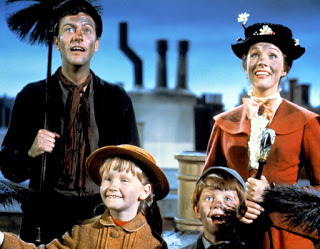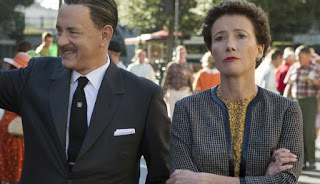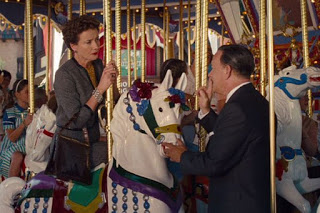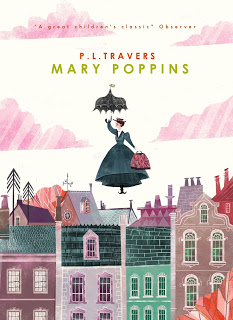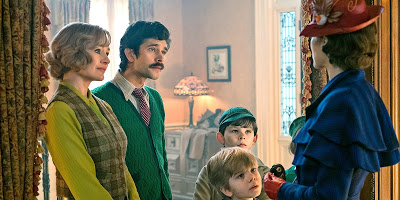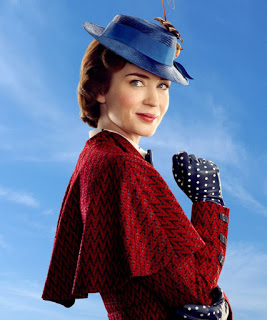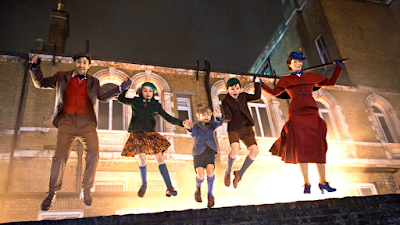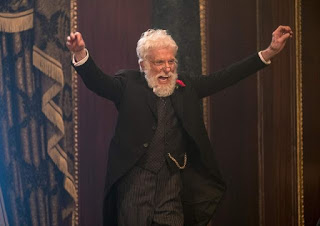Mary Poppins Plus
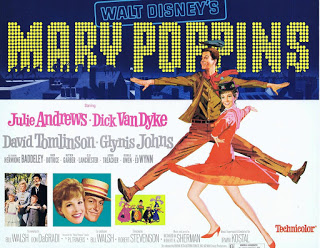
Mary Poppins (1964) - 8.5/10
Director: Robert Stevenson
Somehow in my all too many years I never got around to seeing this film.
It came out in 1964 in the same year my family moved overseas for the next
seven years and by the time I came back in pre-video times there was no way
to see it. When it came out on video I was into foreign and contemporary
films and the idea of sitting down and watching a saccharine children’s movie
was as painful as a kidney stone going through you. But the recent raves
for the new Mary Poppins made me curious to watch the old one. With a shudder
I jumped in realizing that years of cynicism, the brittleness of age, the
rust that encroaches upon us as we grow up, the small failures of life, dreams
that slowly unseeingly slipped away would be like a concrete wall between
me and this happy dappy film. But as I watched, the hardened exterior began
to crack one chip at a time – the nonsense songs, the awful jokes, the wonderfulness
of Dick Van Dyke, the overflowing optimism, the vitality of Julie Andrews
in her film debut, the eccentricity of the Admiral who Never Goes to Sea
or Uncle Albert who floats when he laughs, the fabulous dance of the chimney
sweeps upon the rooftops of London and this fantastical world as seen through
the eyes of children still willing to believe in magic.
Because in the end that is what this film is about – the corroding corrupting
process of life – our loss of imagination, our loss of innocence, our loss
of wonderment as we go from childhood to adulthood – it is as unstoppable
as a hurricane – inevitable and in some way tragic. But I was happy to see
that at least for a few small hours I was able to glimpse into my childhood,
recall how joyful it must have been to watch this at 10 years old. Not so
bad at 65 either.
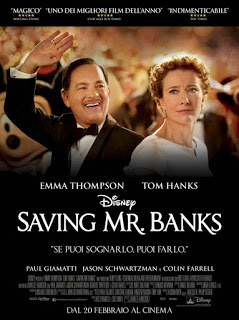
Saving Mr. Banks (2013) - 7.5
Director: John Lee Hancock
After having watched the original Mary Poppins earlier in the day for the
first time I thought it might be interesting to see this film - a fictional
recounting of the making of that film. Fictional yes, but from what I can
tell fairly faithful to what really happened. For 20 years Walt Disney had
attempted to get the movie rights to Mary Poppins from author P.L. Travers
but she had refused to agree for fear of seeing her beloved character turned
into a film mockery. Travers wrote eight Mary Poppins books - the first one
in 1934 and the last in 1988. They were enormously popular with children
but by 1964 sales were way down and Travers was in danger of losing her house.
So she agreed to at least meet Disney and crew and see what they had come
up with. She had a few stipulations - small ones - no music, no animation,
no color red and no Dick Van Dyke - she wanted Laurence Olivier.
One small fib that the film details is that at the premiere she cried because
she was so touched - in fact she cried because she hated the final product
so much - everything about it - the music, the animation, Dick Van Dyke but
primarily how they turned Mary Poppins into this sweet overly cheerful optimistic
do-gooder. She was so embittered against Disney for betraying her that years
later when a play of Mary Poppins was produced in London she would only sign
the dotted line if no Americans were involved! But on the other hand she
made loads of money and wrote some more Mary Poppins books.
It is ironic that this woman who wrote these books that children loved so
much was - as portrayed by Emma Thompson - a horrible, brittle, extraordinarily
difficult person to get along with and certainly to work with. A pencil thin
Thompson is amazing wound up like a top ready to unspool at any moment. She
never really tries to make the audience like her though she does humanize
her a tad bit near the end which admittedly felt a bit false. The film shifts
back and forth between the present and flashbacks to her relationship with
her charming but nay-er-do-well father who died when she was young - implying
that Mr. Banks was inspired by her father and perhaps to explain why that
sweet child turned into such an angry sour adult. It is Thompson's film from
beginning to end but she gets fine support from Tom Hanks as Disney and Paul
Giamatti, Bradley Whitford, BJ. Novak, Jason Schwartzman and Colin Farrell
as the father.
Walt Disney was to die two years after this film but Travers lived on to
1996. That may have made her smile. I wonder if she would have liked this
film. Probably more than Mary Poppins. Interestingly, Travers insisted on
all their meetings being taped - they play a snatch right at the end - and
apparently they all still exist. Those would be fascinating to listen to.
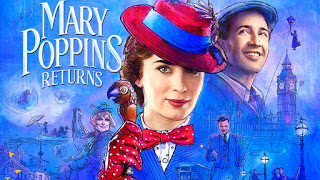
Mary Poppins Returns (2018) - 8.0
Director: Rob Marshall
Out of curiosity, after having seen the original Mary Poppins and Saving
Mr. Banks which recounts the making of that film, I read a few chapters of
the original book from P.L. Travers written in 1934. It was charming - a
sense of the absurd and a piquant sense of humor. For children most definitely,
but smart children. I was also a bit mystified as to why Travers hated the
film so much - yes the music and animation - but it certainly captures the
book's fantasy world with the Admiral next door, Mary Poppins sliding up
the banister, the bag that has the world inside it and jumping into the sidewalk
pictures drawn by Burt. All of that from the book. Admittedly, the book had
four children but reducing children by half is always a good thing. But if
she hated that film, chances are she would have hated this one too because
it too is infused with songs and the dreaded animation (done in old Disney
style).
I thought it was marvelous if perhaps too long at 130 minutes for unruly
children (though the ones at my showing came out prancing like ponies with
enormous smiles on their faces) - it takes the fanciful flights of the first
film and overlays it with a touch of melancholy and angst for the modern
age. There are if I recall five or six huge set pieces that were astonishing
in their technical prowess - the one with Meryl Streep is a classic and the
one clearly inspired by the chimney sweep rooftop dance number is great -
all full of bravado and creativity. The songs don't capture the lovely nonsense
of the first film but are quite fine - though I kept hoping Supercalifragilisticexpialidocious
would sneak in there somewhere. It doesn't.
But another classic does. Dick Van Dyke. Not playing Bert but the banker
who is now an old man - like Van Dyke. But when he does a little tap dance
on a table my eyes misted up a bit I must admit. And then they give us Angela
Lansbury with a song as the magic balloon woman - nice to see her. Her first
appearance in films goes back to 1944's classic Gaslight. Remarkable.
This is not a remake thankfully but a legitimate sequel as the two children
Michael (Ben Wishaw) and Jane (Emily Mortimer) are now grown-ups in their
late 30's or so - the parents have passed on as has Michael's wife leaving
him to take care of three children. Jane is a spinster (in those days an
unmarried woman of her age was considered a hopeless one) who tries to organize
workers (the mother if you recall was doing the same for women rights) and
has not a prospect in sight. The maid Emily is still in service and the Admiral
is still setting off his canon next door. The Bank now being run by the evil
nephew (Colin Firth) is trying to foreclose on the family house and there
seems to be no way to stop them. Enter Mary Poppins (an amazing Emily Blunt)
on a floating umbrella to set things right. Burt is off traveling but he
is replaced by a lamp lighter played with total zest and charm by Lin-Manuel
Miranda. Michael and Jane remember Mary Poppins but think the magic was just
childhood memories gone astray - but the magic is back.
I don't know if over time this will be held in the same iconic regard as
the first film - loved by proceeding generations who introduce it to their
children - that sense of innocence may be gone - a thing of the past in a
cynical age - but I hope not. Mary Poppins is Nearly Perfect in Every Way.


